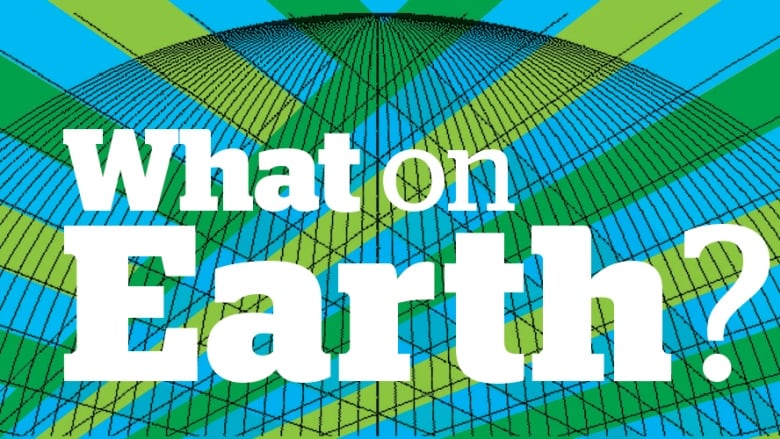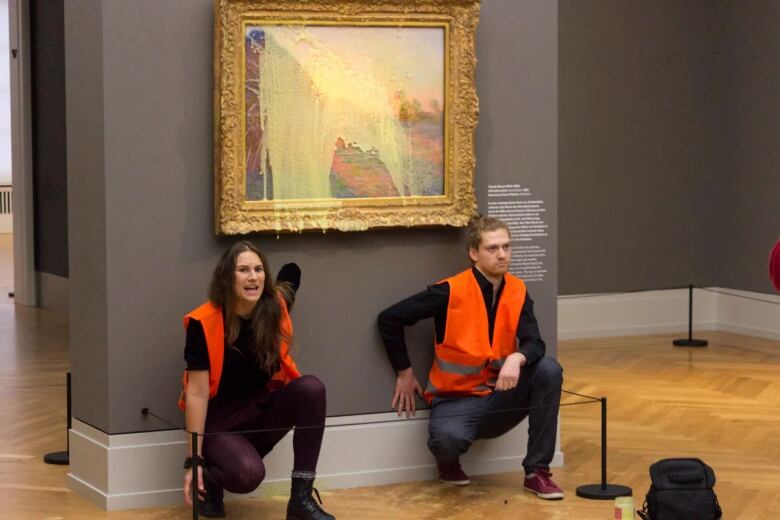From throwing soup to blocking traffic, what makes an effective climate protest?
Also: Taking eco-activism to new heights - literally

Our planet is changing. So is our journalism. This weekly newsletter is part of a CBC News initiative entitled "Our Changing Planet" to show and explain the effects of climate change. Keep up with the latest news on ourClimate and Environment page.
Sign up hereto get this newsletter in your inbox everyThursday.
This week:
- From throwing soup to blocking traffic, what makes an effective climate protest?
- Parkour artists take eco-activism to new heights literally
- 'I hate to call it retirement': David Suzuki on life after The Nature of Things
From throwing soup to blocking traffic, what makes an effective climate protest?

In recent weeks, a brazen yet non-violent approach to environmental activism has been dividing the public, provoking questions about the quote-unquote right way to garner support for climate action.
In the leadup to COP27, the UN climate conference in Sharm el-Sheikh, Egypt,next month, activists in Europe have been using a variety of measures, from chucking mashed potatoes at Claude Monet's painting Les Meules to tossing tomato soup at Vincent van Gogh's Sunflowers to gluing themselves to a 500-year-old copy of The Last Supper to smashing chocolate cake on a waxwork figure of King Charles.
While the paintings were behind protective glass and unharmed, the tactics sparked debate on social media and elsewhere not about the climate crisis, but about whether civil disobedience had gone too far.
One person tweeted, "Chucking soup on a Van Gogh is arrogant," while another posted, "Tinned tomato soup on Van Gogh, and instant mash on Monet? No class at all. (Ps, agree with the aims, not the method)."
Phoebe Plummer, one of the activists arrested for throwing soup at the van Gogh in London's National Gallery, defended her technique, saying, "Are you more concerned about the protection of a painting or the protection of our planet and people?"
University of Maryland sociologist Dana R. Fisher, who is writing a book about disruptive activism, said what we're seeing is "tactical innovation" that is, when marches and sit-ins no longer draw media attention, social movements often invent new approaches to get people talking.
Fisher said the civil rights movement in the United States saw some success in the 1960s when it started using tactics that were intentionally confrontational with police.
"The idea being that watching people get beaten up on television actually is counterproductive to maintaining the status quo, and we do see that there have been some concessions made politically when that happens," Fisher said.
Is throwing food at art an effective climate action? Fisher said it depends on how you define success.
"This kind of a tactic is specifically about getting media attention and keeping the conversation focused on the issue," she said.
The recent art actions have certainly done that, generating international news headlines, including reports on Al Jazeera, NPR and the Japanese public broadcaster, NHK.
But will that translate into immediate collective action?
"The activists do not think that they are going to have the prime minister call them up and say, 'OK, we're going to switch to clean energy now. We're going to phase out fossil fuels,'" Fisher said.
"What they think is that if they're lucky, they'll grab attention and we'll all debate it on Twitter, and the media will talk about it. And a lot of people who care about climate change will watch and think about the message that's behind the tactic."
Environmental group Extinction Rebellion has long tested the limits of the adage "any publicity is good publicity," often drawing outrage for its more aggressive tactics. Recently, activists with Just Stop Oil sparked anger when they blocked traffic in London and caused major commuter delays. Videos show frustrated citizens dragging protesters out of the road, yelling and swearing at them.
These types of stunts aren't about changing hearts and minds, Fisher said, but about mobilizing people who are already sympathetic to the cause.
Many observers have accused activists involved in the art protests of hurting the movement.
In a response to the van Gogh stunt, one post said, "Targeting internationally important works of art won't increase support for your cause, or create change. It'll just turn people who have always supported the protests and the need for change against you, whilst giving bait to right-wing hacks."
Fisher said research suggests that even if confrontational activism turns people against a specific activist group, it's not likely to be counterproductive to the larger cause.
"There's very little evidence that people who watch this kind of tactic are no longer going to support somebody who's running for office who wants to address climate change," she said.
"They may not support the organization that's deciding to throw soup. They may not support groups that want to block the streets. But they still are going to support the overall issue and it may make them pay more attention."
As the sense of urgency grows and more countries experience climate-related disasters such as the extreme flooding in Pakistan and drought in Somalia Fisher said she expects to see more confrontational activism.
"What exactly are [protesters] supposed to do? I think that it actually is quite rational for them to do something that gets attention because in a lot of ways they've been screaming into the wind for a long time now."
Jaela Bernstien
Reader feedback
Mary Packer, writing in response to our recent item on how Environment and Climate Change Canada isintegrating Indigenous science into federal policy-making decisions, had this to say:
"'Science' does NOT have an adjective. There is no Indigenous, Spanish, Chinese or American 'science.' Science is the pursuit of truth."
Write us atwhatonearth@cbc.ca.
Old issues of What on Earth? are right here.
CBC Newshasa dedicated climate page, which can be found here.
Also, check out our radio show and podcast.Can you put a price on a park? This week's episode of What On Earth looks at the growing trend of municipalities and First Nations determining the value of natural assets, in a bid to preserve and restore them.What On Earth now airs on Sundays at 11 a.m. ET, 11:30 a.m. in Newfoundland and Labrador. Subscribe on your favourite podcast app or hear it on demand at CBC Listen.
The Big Picture:Eco-activism reaches new heights literally
The fossil fuel crisis spurred by Russia's invasion of Ukraine is having a visceral effect in Europe. Fear of national gas shortages as winter approaches has led to an array of desperate measures, from Germany keeping nuclear plants online to British utilities warning of planned power outages to people in the Czech Republic vacuuming less and unplugging appliances when they're not in use.
While governments have the biggest influence in times like this, that hasn't stopped some enterprising citizens from addressing the energy crisis their own way. One example: parkour groups. Parkour is a type of gymnastic adventurism in which people climb and jump through urban environments, basically getting into spaces that most people can't. Groups such as the Paris-based On the Spot collective are using their cunning and athleticism to turn off the outdoor lights of businesses after hours, thereby reducing the power load.
On the Spot has actually been acting against light pollution and wasteful energy use in cities across France for several years, but amid the backdrop of the continent's energy woes, these daring acts have taken on a more profound significance.

Hot and bothered: Provocative ideas from around the web
-
Toyota was once at the forefront of environmentally friendly vehicles (see: the Prius), but the Japanese automaker ended up falling well behind the major automakers and Tesla in producing low-emissions cars. Now, it is frantically attempting a reboot of its electric vehicle strategy.
-
The International Energy Agency said it expects fossil fuel demand to peak in the next 15 years.
-
Every country in the world is feeling the effects of climate change, but not every nation gets the same attention. This feature by our colleague Nicole Mortillaro explores the idea of "psychic numbing," which explains why we seem largely unmoved by the mass suffering of people in other parts of the world, particularly the Global South.
'I hate to call it retirement': David Suzuki on life after The Nature of Things

After 44 years of hosting CBC's The Nature of Things, David Suzuki's tenure is coming to an end.
While the upcoming season will be his last, that doesn't necessarily mean the public will see or hear less from the iconic and sometimes controversial Canadian environmentalist.
"I hate to call it retirement," Suzuki said in an interview on The National with host Ian Hanomansing. "I'm just moving on."
His final season with the nature and science-focused series launches in January. In a statement, CBC management said new hosting plans will be confirmed "in the coming weeks."
Suzuki said he has wanted to retire for a while, but stayed on with the show to make sure The Nature of Things wouldn't be cancelled after his departure.
The show and Suzuki have come a long way since he started hosting in 1979. When he kicked off his broadcasting career in the 1960s, Suzuki's casual style stood out.
"I had a headband and hair down to my shoulders and granny glasses, and the scientists were outraged that this hippie is talking about science," he said.
But Suzuki was able to connect with the audience. Through The Nature of Things, Suzuki shared his passion for science and nature, from explaining how a ballpoint pen works to discussing the 1980s battle over logging on British Columbia's Haida Gwaii, formerly known as the Queen Charlotte Islands.
It's through interviewing Haida people that Suzuki said he first came to understand how nature and humans are interconnected. "Through them, I saw there is no 'environment out there' ... the environment is what makes us who we are."
Suzuki has earned a reputation for speaking his mind and sometimes landing in hot water. He's made controversial statements on the safety of genetically modified foods. Last year, Suzuki was accused of inciting eco-terrorism for saying that if the federal government doesn't take climate change seriously, people will blow up pipelines. Critics have also suggested that the environmentalist is a hypocrite for living in a multimillion-dollar waterfront home in Vancouver.
"This kind of attack is used as somehow a reason to avoid whatever I'm saying. But that doesn't mean the message isn't real," Suzuki told Hanomansing.
A scientist by training, Suzuki said he never planned on becoming a full-time broadcaster. After eight years of post-secondary studies in the United States, he returned to Canada in 1962 with plans to pursue a career as a geneticist.
His introduction into journalism started with a series of TV episodes about genetics, broadcast on a local CBC Alberta channel on Sunday mornings. Suzuki was teaching in the genetics department at the University of Alberta at the time.
"I started meeting people on campus who said, 'I really liked the show you did last week.'" Suzuki said he was surprised how many people were watching TV on a Sunday. "That's when I realized this is a powerful medium."
He would later go on to become the first host of CBC's radio program Quirks & Quarks, and in 1979, he took over as host of The Nature of Things, which debuted in November 1960.
"I wanted Canadians to know that science is important," Suzuki said.
Looking back at his on-air career, he said he feels privileged to have been a part of The Nature of Things and is proud of what it achieved, although he doesn't see it as his accomplishment alone. As for his environmental activism, Suzuki said he has more work to do.
"Overall I feel like a failure, being part of a movement that has failed," he said. "All I want is to be able to say to my grandchildren, 'I did the best I could.'"
As he transitions into the next phase of his life, Suzuki said he believes that more than ever, it's his responsibility to call it like it is.
"I don't have to kiss anybody's ass in order to get a job or a raise or a promotion," he said. "I'm free now, as an elder.
"As an elder, you're way beyond worrying about more power or money or fame. We can now speak the truth. We can look back and say, 'This is BS.'"
Jaela Bernstien
Stay in touch!
Are there issues you'd like us to cover? Questions you want answered? Do you just want to share a kind word? We'd love to hear from you. Email us atwhatonearth@cbc.ca.
Sign up hereto getWhat on Earth?in yourinbox every Thursday.
Editor: Andre Mayer | Logo design: Skdt McNalty













_(720p).jpg)


 OFFICIAL HD MUSIC VIDEO.jpg)
.jpg)



























































































